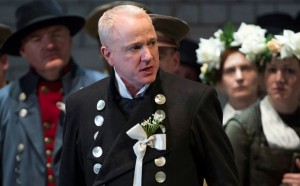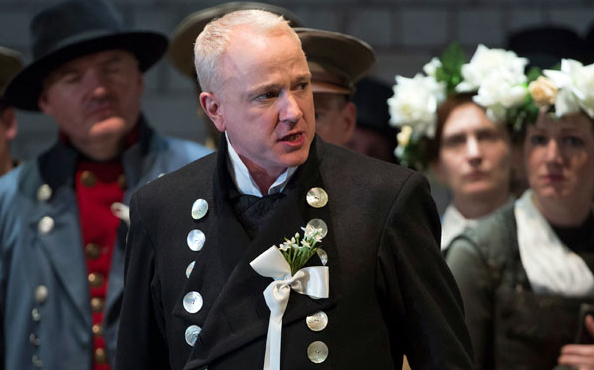 Welsh National Opera’s Lohengrin at the Birmingham Hippodrome was breathtakingly good. From the opening bars of the familiar but nonetheless mesmerising overture, beautifully conducted by Lothar Koenigs, it was clear the evening was going to be very special.
Welsh National Opera’s Lohengrin at the Birmingham Hippodrome was breathtakingly good. From the opening bars of the familiar but nonetheless mesmerising overture, beautifully conducted by Lothar Koenigs, it was clear the evening was going to be very special.
Visually the production was stunning. The monumental sets, the costumes and lighting were remarkable but they enhanced rather than distracted from the performances. The chorus sounded and looked good but it was the principals that shone. I loved the beginning of Act 2 with the two plotters, Telramund, well sung and acted by Simon Thorpe, and his wife Ortrud, the menacing Susan Bickley, lurking in the shadows of the giant, windswept city square, falling out over their failed plot to accuse the beautiful Elsa of murder. The lighting created effects were redolent of German expressionist cinema and Ortrud’s costume suggested a scorpion only later to be torn off to reveal a spider concealed beneath.
 The wedding preparations, with Elsa slowly progressing behind a row of upper windows, were sublime and Emma Bell was convincing as the wronged but ultimately misguided heroine. I think the only slightly weak link, and this is being a bit niggly, was the King. Although he was well sung by Matthew Best, I felt he wasn’t quite regal enough. This was an issue with the way he looked rather than sang. I would have liked a bit more majesty.
The wedding preparations, with Elsa slowly progressing behind a row of upper windows, were sublime and Emma Bell was convincing as the wronged but ultimately misguided heroine. I think the only slightly weak link, and this is being a bit niggly, was the King. Although he was well sung by Matthew Best, I felt he wasn’t quite regal enough. This was an issue with the way he looked rather than sang. I would have liked a bit more majesty.
 I liked Peter Wedd in the title role very much. It was easy to understand why the court at Brabant believed he was sent from God. With his white hair and slim build he had an ethereal quality which you certainly could not attribute to many Lohengrins, particularly Placido Domingo, for example. Mr Wedd’s singing was beautiful but he does not have the raw power of Domingo. There were pros and cons for this. With his first entrance his voice had an otherworldly, angelic quality as though it was wafting in across the water with the swan that bore him. Where it was less successful, I thought, was at the end of the opera. In Fernem Land is one of Wagner’s, if not opera’s, greatest songs but it is also the explanation and the dénoument of the whole piece. The first part was sung too quietly and was almost a guilty confession rather than a defiant assertion – but I think this was a directorial issue rather than one of performance.
I liked Peter Wedd in the title role very much. It was easy to understand why the court at Brabant believed he was sent from God. With his white hair and slim build he had an ethereal quality which you certainly could not attribute to many Lohengrins, particularly Placido Domingo, for example. Mr Wedd’s singing was beautiful but he does not have the raw power of Domingo. There were pros and cons for this. With his first entrance his voice had an otherworldly, angelic quality as though it was wafting in across the water with the swan that bore him. Where it was less successful, I thought, was at the end of the opera. In Fernem Land is one of Wagner’s, if not opera’s, greatest songs but it is also the explanation and the dénoument of the whole piece. The first part was sung too quietly and was almost a guilty confession rather than a defiant assertion – but I think this was a directorial issue rather than one of performance.
That aside, Welsh National Opera’s Lohengrin is not only an outstanding piece of opera, it is an outstanding piece of theatre. I don’t anticipate seeing a better production, or at least, one that I will enjoy more. Michael Hasted 14th June 2013


